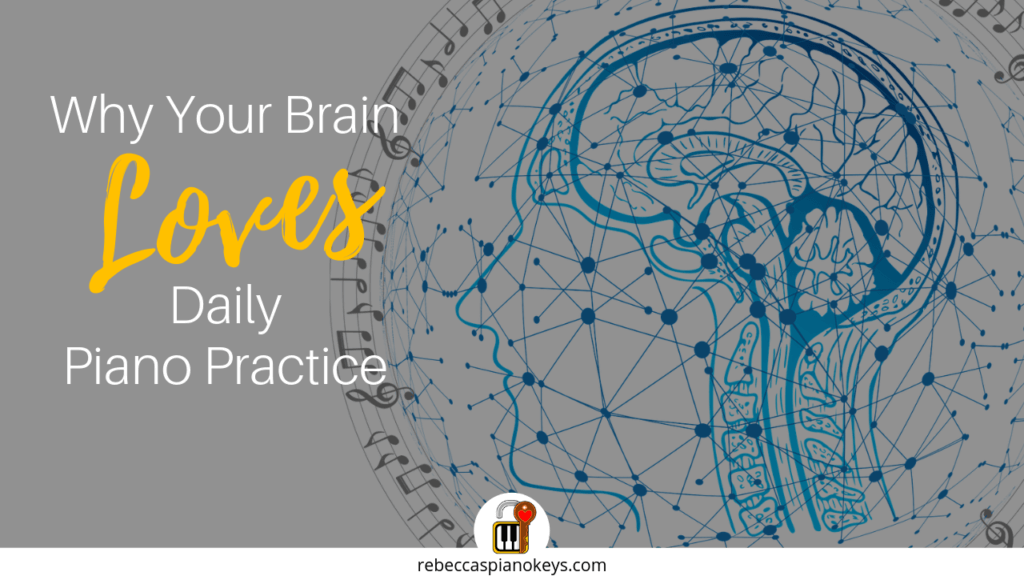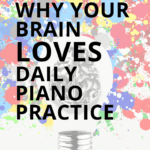Last Updated on October 19, 2022 by Rebecca
Every piano teacher in the history of ever has told their piano students that the secret to piano success is effective daily practice.
But how many teachers really explain to their students why it's so important to practice every day (or as often as possible)?
If you're anything like me, you have a hard time committing to anything if you don't understand why you're doing it. Which is why today's post is all about understanding why daily practice is so important when learning piano.
“My teacher said so,” and “It will help me improve my skills” are not good enough reasons! The first is an external motivator (internal motivation is always more effective), and the second is so vague is packs no punch.
You're going to have days when you're too busy, or too tired, or just plain don't want to practice piano. This is just a fact of life. Even the world's most talented pianists have these days!
And there are only 3 things that will motivate you to practice anyway on those days when you would really love to just skip it:
1) A clear connection to your own personal why.
This comes from understanding exactly why you want to learn piano in the first place. Why is learning piano important to you? In what ways does learning piano positively impact your life? What do you want to get from this experience?
2) A solid understanding of why practicing piano daily leads to success.
This comes from understanding why daily practice is important in the first place. From understanding how your brain learns, and how daily practice fits into that process.
My free eBook, Why Your Brain Loves Daily Piano Practice, aims to help explain this so you can feel an extra boost of motivation to practice on those days when you're tempted to avoid your piano.
3) The satisfaction of continually experiencing results.
This comes from understanding how to practice piano effectively.

Even if you practice every day, if you're using ineffective practice strategies, you will not get the results you want. And this can feel incredibly frustrating and discouraging.
Conversely, if you have a toolkit of effective practice strategies to choose from every time you practice, you will make progress – satisfying progress! – every day! And what's more motivating than that?
Of course, even the best practice strategies only work if you actually use them!
Which is why today I'm not focusing on how to practice, but rather why you should practice piano every day. I want to give you a better understanding of what happens in your brain when you practice, so you'll have the motivation to get yourself onto your piano bench in the first place!
The short version is that you should practice piano every day because:
- Repetition strengthens neural pathways in your brain.
- No piano practice session is complete until you've slept on it.
- Recency of practice affects ease of recall.
- Talent is not the most important predictor of success when studying piano.
In my eBook Why Your Brain Loves Daily Piano Practice, I explain these 4 points in greater detail, and I provide scientific evidence to support the information I present. I also include a list of recommended reading, for those of you who are really interested in all the nitty-gritty neurosciency details (it's fascinating stuff!). And finally, I provide my Top 4 Tips for Achieving Daily Piano Practice.
But before you go and download my book, I want to remind you that daily practice is only half of the equation.
As I mentioned above, in order to get the results you want, you also need to make sure that what you're doing at your piano each day is actually effective practice.
Otherwise you're just running on a treadmill… working your tail off and getting nowhere fast.
Why Your Brain Loves Daily Piano Practice focuses primarily on the impact of daily practice and how to achieve it. How to practice effectively is something I'll touch on more in a future resource.
But for now, I'll give you the simplest and best tip I can:
Playing a song from beginning to end, is not effective practice, no matter how many times you do it.
To practice effectively, you need to isolate a very small section of music that is giving you trouble (1 measure!) and play it repeatedly.
And I really mean repeatedly.
Like, 100 times.
Which sounds like a lot, but since it's only 1 measure, you'll find it only takes about 5 minutes. (Maybe 10 if you're really struggling, but what's an extra 5 minutes?)
Now what are you waiting for?
Download my eBook so you can learn all the sciency stuff that happens in your brain when you practice!





Thanks for this inspiring “sciencey” explanation… I’m a “mature” beginner to the piano….I’ve been wanting to learn for many years, and finally pushed myself off the face… and bought a Yamaha p-125 digital piano at the Black Friday sales…. what you say here reaffirmed how I’ve already been doing, and is inspiring me to keep going. My goal is 20 minutes a day, every day…..
Hi Dale! That’s wonderful that you’ve taken the plunge to pursue your piano dreams! You are in for an adventure! 🙂 20 minutes a day is a great goal for a beginning pianist! I’m so happy that I’ve been able to inspire you! Hopefully my resources will continue to be helpful for you as you progress. What kind of music are you hoping to learn to play?
Wowww, this inspired me to want to learn so strongly now. That science in the article helped a lot to reaffirm some of the techniques. I can’t wait and am going to keep my Akai MPK mini/ piano app on me at all times and practice where ever I’m at…in my car, on break, etc. Thanks for all your efforts your inspiring me to WANT to learn and dedicate myself..I’ll let you know of my progress TY
Hi Cesar! Thanks for the positive feedback! I had no idea what the Akai MPK was, so I had to look it up. It looks like a fun little controller that would be tons of fun for melodies, beats, and really cool layered loops effects! I’m glad I’ve inspired you to dedicate yourself to music creation! It’s such a fulfilling passion! I look forward to hearing about your progress! 🙂
Great post! Creating a rhythm of daily practice is the most important – having the same pattern everyday, you create a habit and that’s hard to break. Thanks for sharing ♥️ ♥️ Let me know if you are interested in doing collabs! xx
Hi Tiffany,
That’s exactly right! What instrument(s) do you play?
Hi Rebecca, I mostly play guitar. By any chance, if you are interested in doing collabs, you can check out the offers in our Collaboration section at Phlanx! https://phlanx.com/collaborations You can also check us out at Instagram @phlanxglobal
Cool. Thanks for reaching out. I’ll check it out. 🙂
this part is really true… “practice in small sections” rather than practice from start to finish. My children play the piano. I always emphasize especially to my eldest who play advance level repertoire, that practice on different sections. It is helpful to have someone to pick different spots of the music piece randomly.
Hi Alena,
Absolutely! Some parts need practice more than others… so practice those parts more than the others! It just makes sense! And also, it’s the repetitions that are most important, so if you’re practicing smaller sections, it is easier to get more repetitions in less time! I hope your children are loving piano! 🙂